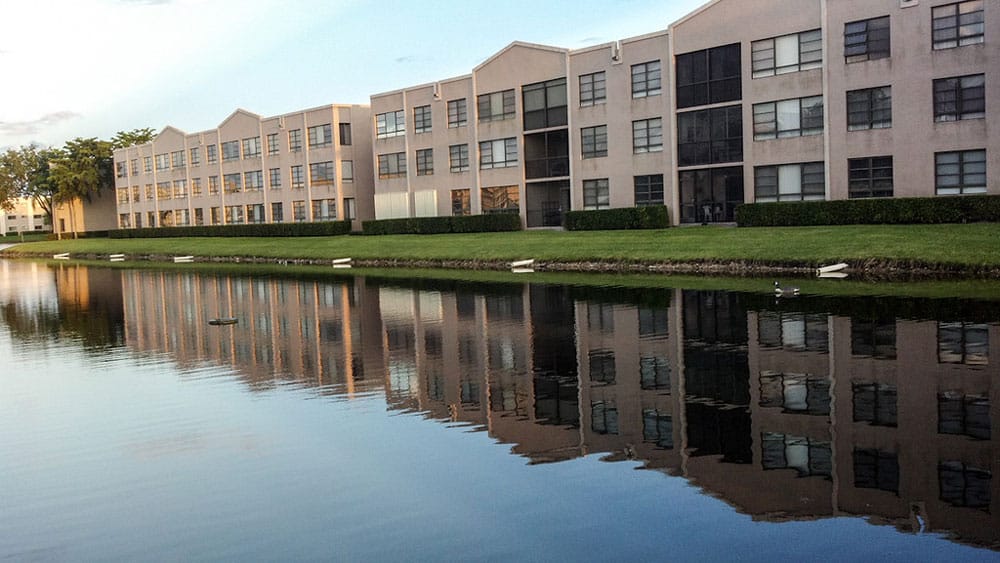A condo structural inspection is often necessary for the safety of its tenants. The responsible association or owner should hire a licensed structural engineer to perform this inspection. A structural engineer can focus on foundation walls, framing elements, stormwater management characteristics, and more. Most importantly, a commercial structural engineer can help detect any potential problems.
Recently Penn Valley Engineering had the privilege of returning to a 3-building condominium. It had been several years since we had detected some issues with two of the buildings. The condo president, officers, and board members had successfully completed most of our structural recommendations and now felt the need to have the other building’s structural integrity inspected.
There were questions about whether additional supports were needed under the three, uppermost, stairway landings. Concerns also involved floor joists and if there was a need for a post to support the landings from the ground. While performing the condo structural inspection, we were also asked to “have your engineer visit and inspect the property again to see how the repairs are holding up and to determine if there are any new issues.”

Condo Board Record Keeping
Even though the condo association had elected a new president and board members, this group was prudent and the well-documented reports were properly archived. Kudos for their good documentation! The previous work of support beams, masonry piers, and foundation stabilization were re-inspected. The viewable perimeter foundation walls from the interior and exterior showed no obvious signs of structural distress, movement, or new cracks differing from the previous inspection.
However, the recommendation regarding insulating the water pipes and installing mechanical ventilation had not been implemented. At this most recent condo structural inspection, our structural engineer discovered what appeared to be a PVC condensate drain line, likely from the above unit, while inspecting the floor framing. No water should be draining directly below the building within the crawl space. This condition is not desirable, since this will trap the drained water within the floor-framing cavity and could cause water/moisture-related issues, such as wood rot decay and mold growth. It was recommended to remediate this condition by extending the drain piping directly to the exterior perimeter.
ARTICLE UPDATE: The Structural Integrity Bill was signed into law in New Jersey on January 8, 2024. This legislation mandates rigorous structural inspections and capital reserve studies. Penn Valley Engineering is uniquely positioned to help community associations in South Jersey and Pennsylvania comply with this law. Read more about this law and how we can ensure your building’s safety and compliance.
Monitoring Repairs Following a Condo Structural Inspection
While performing the condo structural inspection, a few vertical cracks along one wall were observed. Some of these cracks had been noted previously. Additional cracks, which could be indicative of foundation settlement and movement of the condominium were noted. In this case, it was not apparent yet that remediation action was necessary. PVE recommended to, again, patch these cracks with a non-shrink cement mortar. In doing so they can be monitored. If the cracks reappear or new cracks form, a further structural evaluation is warranted.
In closing, it is recommended for a condo structural inspection be scheduled on an annual basis in order to establish a baseline for repairs and future planning. If safety is of importance to you or your condo association, don’t hesitate to contact Penn Valley Engineering. Order a condo structural inspection as soon as possible. If it’s been a while since one of our engineers (or another professional engineer) has inspected your condominium, make a point to have regular inspections. Your safety is of our highest concern.
Call 856-829-8636 in the south Jersey, southeast Pennsylvania area, or 321-394-8026 in Central Florida. We offer both residential and commercial inspections. Our services also include engineering design and blueprint costs. These are extremely helpful when contacting companies for repair estimates. Our engineering services are offered piecemeal or as one comprehensive package.

 Penn Valley Engineering is a structural engineering consulting firm dedicated to Total Client Satisfaction.
Penn Valley Engineering is a structural engineering consulting firm dedicated to Total Client Satisfaction.